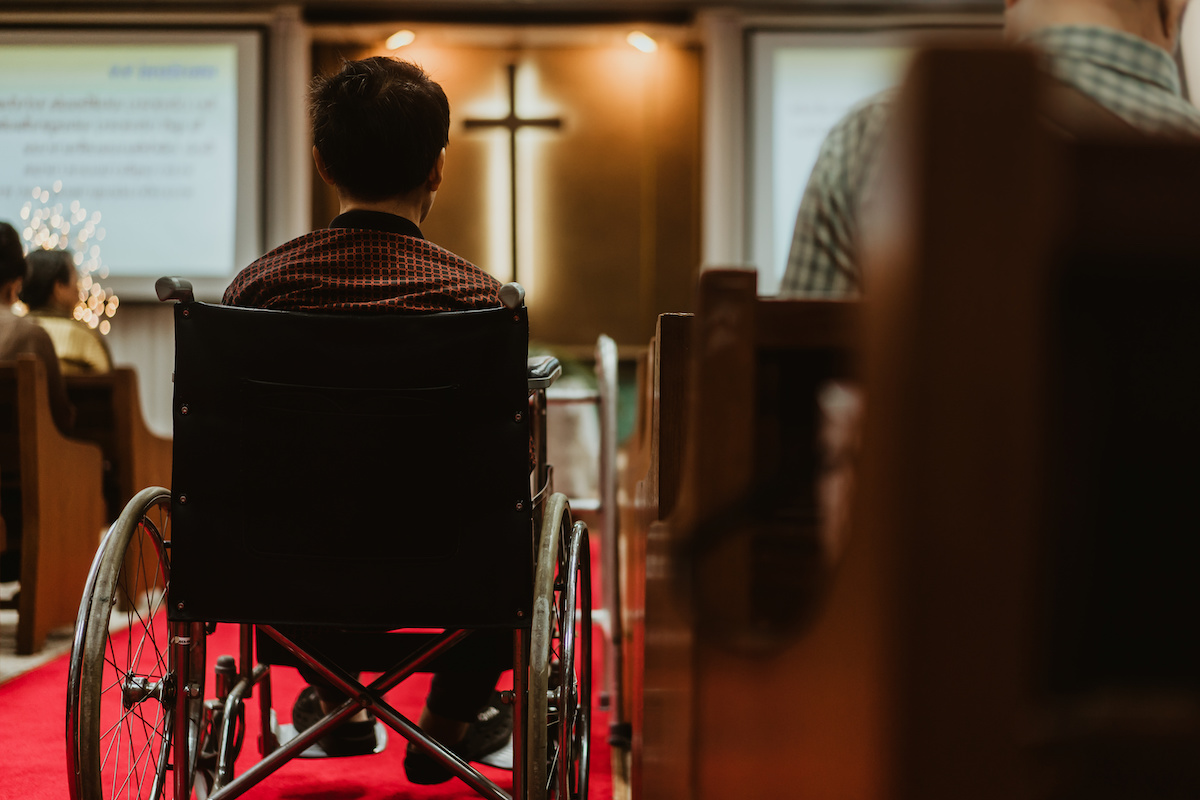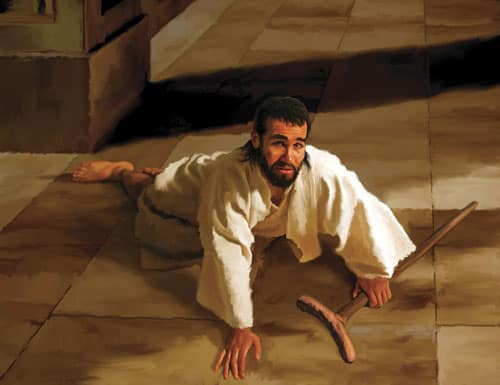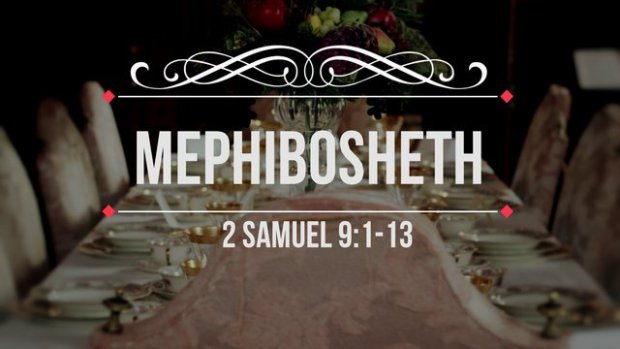
16 Feb A Modern Day Mephibosheth Story
(Writer’s note: I originally wrote this for my church’s blog. Enjoy!)
You may have wondered who is that man in the wheelchair at the 10:45 service. (Actually there’s two of us now. I’m the one sitting in the middle asle toward the back.)
Well, my name is Tait. I came to IAC in January 2005 when I was looking for people my age to be in community with I’ve never left! Through the years, I’ve participated in small groups, taught the 3rd-5th grade class, read scripture. I’ve watched kids grow up, traveled with great people, and watched many friends leave. I even got married and brought my wife, Kelly, to our community.
Last October, I noticed that nobody was writing the sermon reflections in the IAC Notes for quite a while. I emailed Pastor Ken and volunteered to write them. I love writing about the Bible, so this is right up my alley. I can’t imagine not writing them. I hope people are challenged by the questions.
As our current sermon series in First and Second Samual moved forward, I got excited because we would be studying a story that is close to my heart and ministry: the story of David and Mephibosheth in 2 Samual 9.
As we learned from Pastor Ken, David remembered a promise to his beloved friend Jonathan to care for their family if anything ever happened to them.
David asked a servant of Saul’s household if there was someone he could show favor.
“Well there’s one man, but you don’t want him,” the servant told David. Perhaps the servant was already thinking about how it would look to have the king be seen with a disabled person. After all, Mephibosheth wasn’t in good shape. He had been dropped by his nurse fleeing from their home during an attack and ended up needing help to be mobile for the rest of his life.
Mephibosheth had a disability.
David was encouraged to forget about Mephibosheth and leave him for the dogs (after all, a “disabled person” couldn’t be seen in the palace courts!), but David had compassion for Mephibosheth, accepted him as his son, and made a place for him at his table.
It’s interesting that David never acknowledges Mephibosheth’s disability. Mephibosheth does, but David doesn’t. Verse eight: “Mephibosheth bowed down and said, “What is your servant, that you should notice a dead dog like me?” (V. 8) David never answers the question. Instead, he just move on with his plan of restoring Saul’s land to Mephibosheth.
We often see our lack before others do. Say you live in a lower class neighborhood, then one evening you go to the Broadmoor. You walk through the halls and admire the grandness of the hotel. You feel small. You’re not supposed to be there. You’re not dressed appropriately. When will people notice you? What will they say? When will they throw you out?
But imagine someone coming up to you, and instead of saying something about your appearance, he just welcomes you. He tells the servants to offer you a cup of coffee, or even better, a spot in his prestigious family. Wow, talk about a turn of events!
That’s what’s happening with Mephibosheth. He didn’t belong in the king’s court, and he knows it. It’s just a matter of time before the king throws him out of the gates once he finds out who Mephibosheth really is.
But David doesn’t do that. He just welcomes Mephibosheth. That’s all. No judgment. No “hey what happened to you?” Just a hug and perhaps a change of clothes. This is what David did for Mephibosheth, and it’s what Jesus do for us. Perhaps there will be time to do a debriefing session later, but now is the time for the welcome.

In his book on David, Charles Swindoll paints a picture of what life must have been like after Mephibosheth joined David’s family:
The meal is fixed and the dinner bell rings and along comes the members of the family and their guests. Amnon, clever and witty, comes to the table first. Then there’s Joab, one of the guests –muscular, masculine, attractive, his skin bronzed from the sun, walking tall and erect like an experienced soldier. Next comes Absalom. Talk about being handsome! From the crowns of his head to the soles of his feet there is not a blemish on him. Then there is Tamar – beautiful, tender daughter of David. And, later on, one could add Solomon as well. He’s been in the study all day, but he finally slips away from his work and makes his way to the table.
But then they hear this clump, clump, clump, clump, and here comes Mephibosheth hobbling along. He smiles and humbly joins the others as he takes his place at the table as one of the king’s sons.
I love this passage! It paints a wonderful scene of a family affected by disability. David didn’t create a law or a program in order to make Mephibosheth part of his family, he just welcomed him into the family. He had full access to the kingdom. He was the son of the king!
Luke 14 further shows how this is played out. The story is about a king who wanted to have a party, but his friends were too busy to come. Not wanting to cancel the party, the king told his servant to: “‘Go out quickly into the streets and alleys of the town and bring in the poor, the crippled, the blind and the lame.’ ‘Sir,’ the servant said, ‘what you ordered has been done, but there is still room.’ Then the master told his servant, ‘Go out to the roads and country lanes and make them come in, so that my house will be full.’”(Luke 14:21b-23)
There is nothing about healing these people or making their lives better is in this passage. The king just wanted his house to be full. Perhaps he loved to hear the boy with cerebral palsy sing or hear the laugh of the girl with Down syndrome. Whatever it was, the king was just happy to have people with regardless of ability with him.
Notice verse 23. The king says to compel or make people come. Like Mephibosheth, many people who have disabilities have a difficult time believing that they’re valuable and welcomed in God’s church. They think they are trash.
Unfortunately, they’re right sometimes. The church can be a dark place for people who have disabilities. A friend of mine just gave up on the church because he didn’t feel comfortable. People were giving him a hard time and didn’t let him be himself. So he, like so many others, just checked out. If God’s people are this rude, they say, I don’t want to be with them.
How sad. The church should be the first place for broken and disabled people to belong. It is the church where we acknowledge our brokenness is and our need for a savior. But today’s church would rather be a country club for the comfortable instead of a hospital for the sick. Instead of compelling people to come to church, we put out the “closed” or worst, the “you’re not welcome here” sign. The church needs to learn from David and Jesus. We just need to love people and learn their stories. Because once we understand each other’s stories , we can no longer ignore people.
Tait is the church relations director for Mephibosheth Ministry. Mephibosheth is a non-profit ministry whose mission is to train the church to include people who have disabilities in the local congregation. Using the story of David and Mephibosheth as our example, the ministry believe there is room everyone God’s family without having to design special programs or changing current ones. The Body of Christ is more complete when people who have disabilities are a part of it.



cheap hockey jerseys from China
Posted at 07:38h, 10 JuneI was pretty pleased to uncover this great site. I want to to thank you for your time for this fantastic read!!
I definitely liked every part of it and I have you bookmarked to check out new information on your web site.
https://magic-wiki.win/index.php?title=Now_enjoy_time_a_go_of_the_NHL_baseball_9052225032&oldid=356583 https://www.liveinternet.ru/users/x3rtsdv510/post484172286// http://eleanorb4.ek1.pl/2021/05/23/football-huge-bowl-playoff-stock-portfolio/
my web blog – cheap hockey jerseys from China